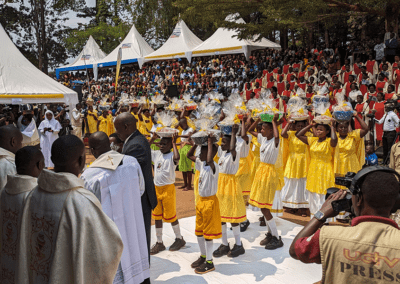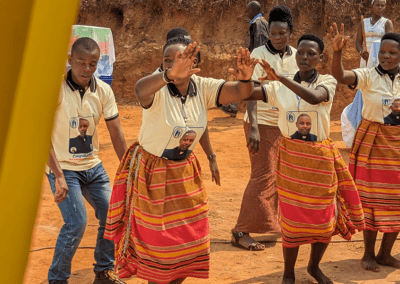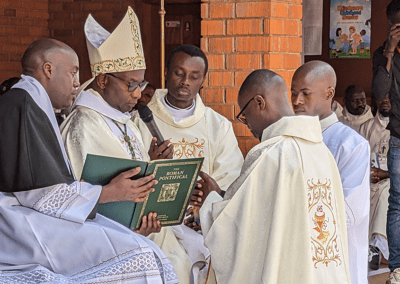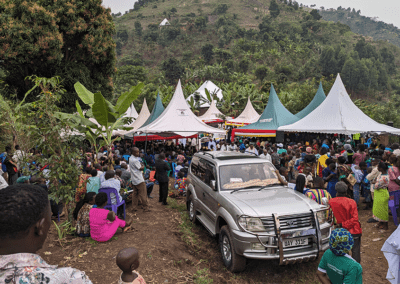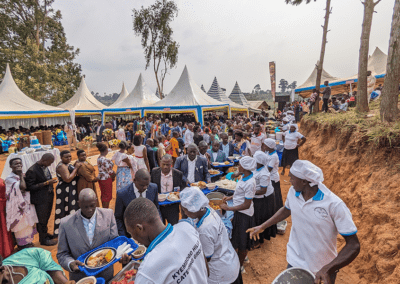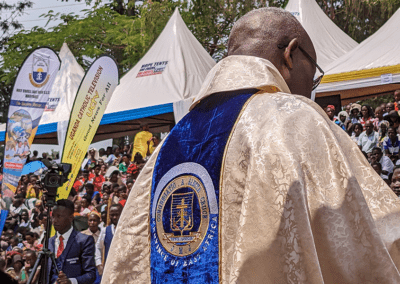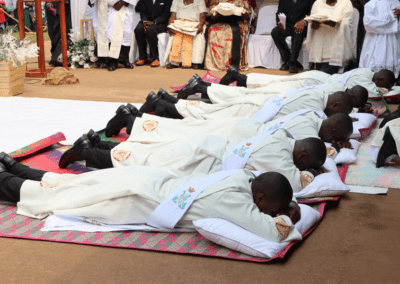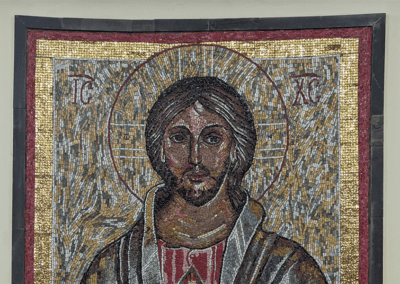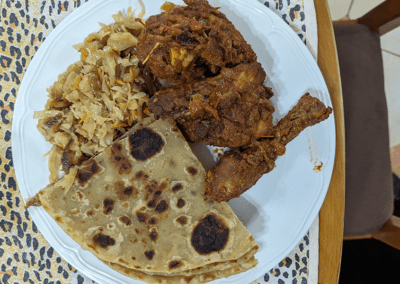Introducing “Letters from Nyumbani,” Reflections from Keenan Bross, C.S.C.
Africa | Blogs | Immersions | Spes Unica
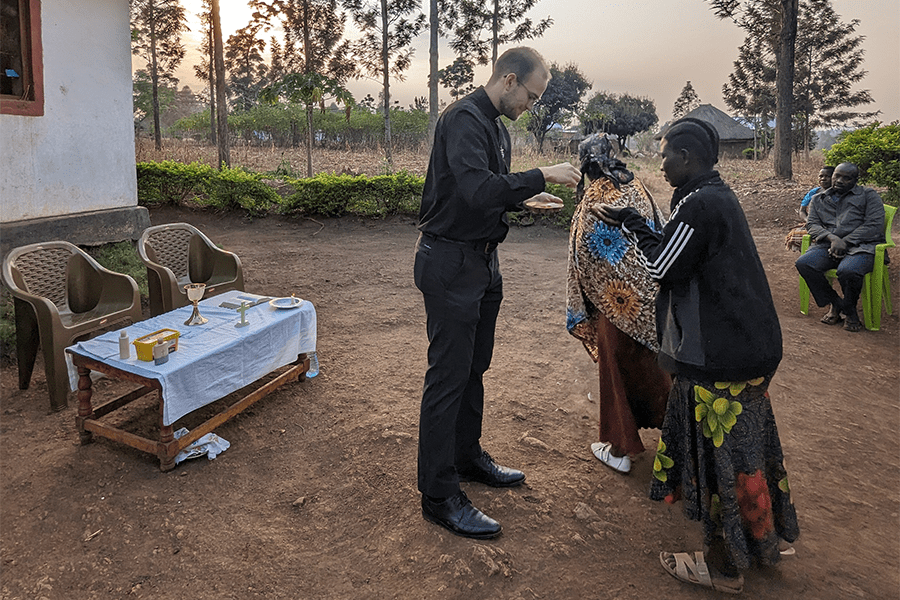
In the “Letters from Nyumbani” series of reflections, Moreau seminarian Keenan Bross, C.S.C., will share his experiences during his pastoral year at St. Felista Catholic Church, a Holy Cross parish in Utegi, Tanzania. The series title includes the Swahili word “Nyumbani,” meaning “home,” a reminder that for Holy Cross religious, “Often we must make ourselves at home among more than one people or culture” (Constitution 2 of the Congregation of Holy Cross).
———
“New Priests and a New Home”
August 1, 2024
Greetings from Uganda, the birthplace of Holy Cross in East Africa. I have spent the past week here for the ordination of 6 of our newest Holy Cross priests and their Thanksgiving Masses. Unlike in the United States where all of our ordinations take place at the Basilica of the Sacred Heart at Notre Dame, each class is ordained at one of our parishes in either Uganda, Kenya or Tanzania. This year’s ordination took place at our historic parish, St. Jude Tadeo, in Kyarusozi, Western Uganda – one of the places Holy Cross has been serving and evangelizing the longest in East Africa.
The ordination was a spectacular event. For St. Jude Tadeo, this was a once-in-a-decade opportunity to gather as many parishioners as possible to witness this beautiful sacrament. It was also an opportunity to put their array of ministries on full display – from the dancing children for the procession and offertory, to the 50+ person choir, to the hundreds of gifts of food and animals brought forward. They set up over twenty tents in front of the Church and on the surrounding hills to make room for the myriad concelebrants, public officials, consecrated religious, and visitors from all over East Africa. Photographers from local, national, and Catholic news outlets swarmed what space was left. You were left with a feeling that something really quite big was happening that day.
As the procession began, the bustling of this 5,000 + person crowd transformed into worship led by the choir. Although Bishop Robert Muhirwa (local ordinary and a University of Notre Dame alumnus) presided over Mass in English, the Choir led us in hymns in the local language, Rutoro. In his homily, the bishop exhorted the men to live by their vows of poverty, chastity, and obedience and to remain close to Jesus through Mass and Eucharistic Adoration. After the homily, the elation of the crowd shifted to quiet reverence as the men came forward for the rite of Ordination. At the litany of saints, the thousands in the crowds all managed to kneel and call down the communion of saints over these men. And after the prayer of consecration, the emcee declared the men to be priests, and the crowd cheered wildly.
The Mass was followed, as is custom here, by a couple of hours of speeches, celebratory dances, and the giving of gifts. By mid-afternoon, the village and its guests were hungry. Somehow the parish volunteers had worked together with caterers and abundant food donations to feed the thousands of people present – and with a truly lavish buffet with meats from goats, chicken, and beef as well as matoke, ugali, rice, and all of the local starches. By late afternoon, most of the villagers walked home and visitors drove back down the dirt roads into town.
In the following days, the newly ordained priests were put to work celebrating their first Masses. Not, as in the US, at the Seminary or a Basilica – but at their own homes. Just as Kyarusozi parish prepared for a massive celebration, these men’s own villages worked together to turn their homesteads nearly into stadiums to host the thousands in attendance at their first Masses – replete with catering thousands of meals, personally crafted programs, gifts for the priest, dances from the local community, and speeches from local leaders and brother priests. Talk about a lot of pressure for your first Mass!
Thankfully, in neither case did these men have to preach. They follow the old custom of having a pastor or priest-mentor preach at their first Mass– often directing at least part of the homily at the “baby” priest himself. On both occasions, the newly ordained priest presided in his own mother tongue. The congregation belted out both words and song in their own language, claiming this newly ordained priest as one of their very own.
Really, beyond the five- or six-hour celebration or the mountains of food, it was the participation of these faithful that amazed me the most. These farming villages scattered throughout the East African countryside can be seen by the global community as a backward, destitute way of life – inferior to the modern city living that most Westerners enjoy. But what I saw far off of the beaten track of “civilization” was not death or decay – it was abundant life! At these celebrations, these farmers and families showed the full vibrance of the Catholic faith lived out in their particular culture. Truly, our missionaries not only brought these rural communities Catholicism; they helped them make it their own. Their traditional dances, native language and way of celebrating have all found a home in our Church – and the Church, in her wisdom, actually preserves these customs. Events like these first Masses and this ordination are powerful moments to see these people’s identities as Toro or Bakonjo and Catholic – intertwined through our faith – on full display!
I thank God for the hundreds of missionaries who have gone before to do this sacred work of Evangelization and Inculturation that I got to witness. These six new priests, raised in these very lands and ordained for the universal Church, is a testimony to those missionaries’ life’s work and a sign of great hope for the Church in these villages and in East Africa.
———
“McCauley House & the Joy of Formation”
August 14, 2024
I spent the past week living into the daily rhythms of our Bishop McCauley House of Formation here in Nairobi – the house specifically for temporarily professed. That week, the 1st years had just returned from home visit and were being oriented into their lives as vowed religious and students of theology in Nairobi. The 4th years were wrapping up their formal studies at Tangaza University, preparing for and taking their “comprehensive” exams. And I was a fly on the wall, preparing to be sent out for ministry on Pastoral Year, joining for prayers, meals, and whatever side quests I could become part of.
Daily prayer at McCauley House was a delight. Lauds begins roughly at the same time as dawn, 6:40 am. The lights come on just a few moments before prayer, the assigned prayer leader in his habit intones the hymn (most of which were in English, often from the breviary, but with melodies completely foreign to me). There were long pauses as the left and right sides alternated strophes – often with me accidentally jumping ahead. And at the time for intercessions, we made the same petitions I have for morning prayer for the past eight years: “Lord God, through the intercession of Basil Moreau…” and “Through the prayers and intercession of St. Andre Bessette…” There’s something to be said for the Holy Cross universality in that!
After morning prayer, the same prayer leader processed in with the presiding priest for Mass at 7:00 am to the first of five hymns picked for each day. After singing just one or two verses in English or Luganda or Kiswahili, Mass begins. At the time for the homily, the priest takes a seat and, with the permission of the local bishop, allows the seminarian to give a reflection – or share the Word, as the guys called it. Near the end of my time there, I too was asked to share the Word and hobbled together something like a Sunday Vespers homily at Moreau Seminary.
Like Holy Cross anywhere, meals follow prayer at McCauley House. Breakfast was often the most lively meal for the day – lasting up to forty-five minutes or an hour – as guys sipped on their tea, spread honey over their toast, or ate freshly prepared breakfast matoke, mashed plantains.. The generous length of time in this particular season might have had something to do with avoiding studies or swapping novitiate stories – but it was rather pleasant anyhow.
Lunch, as more of an eat-as-you-come meal, was often actually a few steps away from the refectory in the TV room, often accompanied by local news from Uganda or Kenya (my weeks also involved some political turmoil), sports highlight reels, or Gospel Choir Music Videos.
Supper, enjoyed after 7:00 pm evening prayer, marked the end of the day for most guys and tended to be a slightly less conversational meal since it requires significant effort to chow down on the fried Tilapia or boiled goat meat accompanied by rice or Ugali, the ubiquitous corn-based porridge of sub-Saharan Africa. Almost all of the men said that, not unlike Moreau Seminary, they eat very well and are grateful for what they have.
Now, unlike Moreau Seminary, where food seemingly magically appears in our kitchen thanks to the labor of a kitchen staff, the men of McCauley House do much of the house shopping. Philbert, the house shopper during my time there, explained that certain items are delivered in bulk – like meats, toiletries, even peanut butter and honey. But otherwise, the men do much of the shopping 15 kilometers south at the Ngong market. It was great fun to accompany Philbert and watch him make his way through the streets picking up a specific flour for chapati, another local dealer for eggs, another for fruits, and another for vegetables. Admittedly, Philbert managed to acquire much of the food without a sweat since he’d befriended a few young bucks to make half a day’s wage loading the car with produce.
Some of the foods even come straight from the seminary garden. On the far side of the property, the men have one corner for plantain trees and cassava roots and another corner for chickens. While I was there one of the chickens fell sick and died. To prevent the spread of the disease we spent one afternoon slaughtering and preparing the other fourteen chickens. The guys found my unfamiliarity with the process so funny that I ended up cutting the heads off of a majority of the chickens, bloodying my sneakers in the process, and learning where the American phrase “running around like a chicken with his head cut off” comes from. The rest of the seminarians were much more familiar with the process and later guided me through boiling the skin, pulling off the feathers, removing the guts (which they called “dissecting”), and cleaning them for cooking. I can say that I definitely learned the meaning of the Swahili proverb Anayechunguza kuku sana, hatamla – the one who over-scrutinizes the chicken won’t eat it. Supposedly, the proverb applies to dating and the hiring process as well. A few days later, though, I was happy to enjoy the fruits of our labor.
During less bloody evening recreation, which the men have each day at 5:00 pm, the sport of choice is volleyball. I was amazed and overjoyed at my 4th-year classmates’ ability to play volleyball. Victor, who was a setter for his high school team, and I became fast friends when we figured out we could connect on quick sets – something I haven’t had the pleasure of since I myself played in high school. Our 4th-year international class identity grew much stronger when we took on the 1st-years and learned, fairly quickly, that their novitiate year must have not involved such extensive volleyball training as ours had.
From the volleyball court to the living quarters, a pervasive characteristic of McCauley House was fun, engaging, and even silly conversation. I can’t tell you how many laughs I shared with these guys as we traded stories from our time falling in love with the Congregation and choosing to dedicate our lives to it. Following one such instance, a Ugandan priest who’s studying at the Catholic University of America turned to me and said: “Keenan, look, this is the joy of Africa.” After at first brushing off his comment as totally cheesy and stereotyping, another wave of laughter swept over the room and I thought: he has a point. There’s a palpable joy and energy in this formation house and in this Province, rooted in the joy of the Gospel, that I want to be part of. Really, a joy that all of us in Holy Cross share in as we do basically the same thing around the world: try to live a life of service, grounded in prayer and brotherhood.
McCauley house, with its full array of common life, is a wonderful incubator for that. Saturdays, the day of the week without school or ministry, are a great example of this “incubator” – and I was blessed to spend my last day there at McCauley on a Saturday. After a morning of prayer and chores, an afternoon of shopping or perhaps some homework, the guys gather for Jumuiya, or small Christian communities, where they meet in regular groups of seven or so around the house for bible study and faith sharing. And after this moment of shared prayer and vulnerability, they gather together for Saturday evening “social,” arrayed with popcorn and roasted nuts, local brews and boxed wine, for what most Americans would simply call a “party.” This lively gathering around tables for “vibes” (talking), Scrabble, “Oh Hell” (a Midwest card game), often lasts somewhat well into the night as the men decompress and forge memories that will sustain them together for their consecrated life. As I prepare for a year of ministry and memory-making in the Province of East Africa, I know there could have been no better launching point than McCauley House of Formation.
Learn more about Holy Cross in Kenya
Published: September 3, 2024
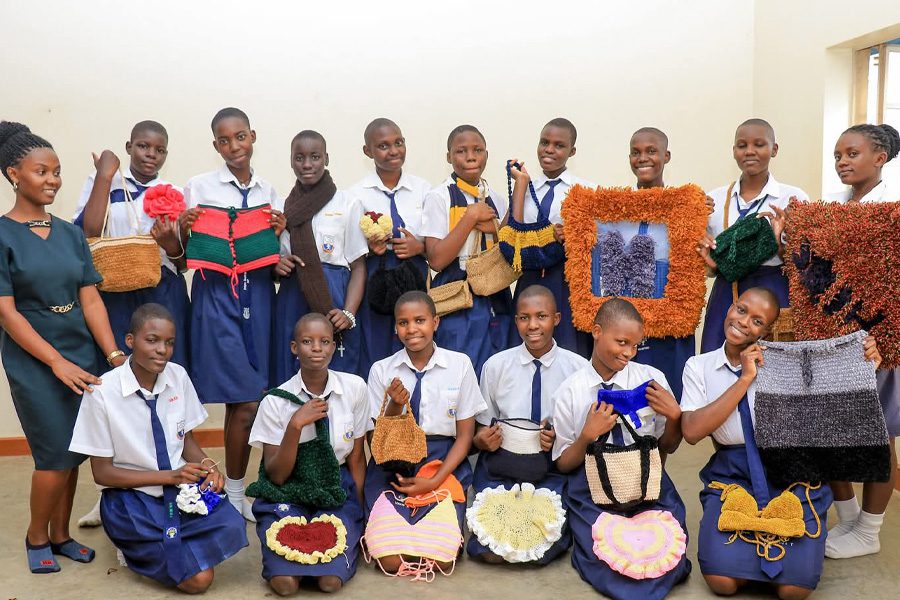
Mary Jane DeLaney Endowment Fund 2025-26 Projects Preview
Every year, the Holy Cross Mission Center (HCMC) facilitates the Mary Jane DeLaney Endowment Fund grant cycle, which supports vulnerable women and...
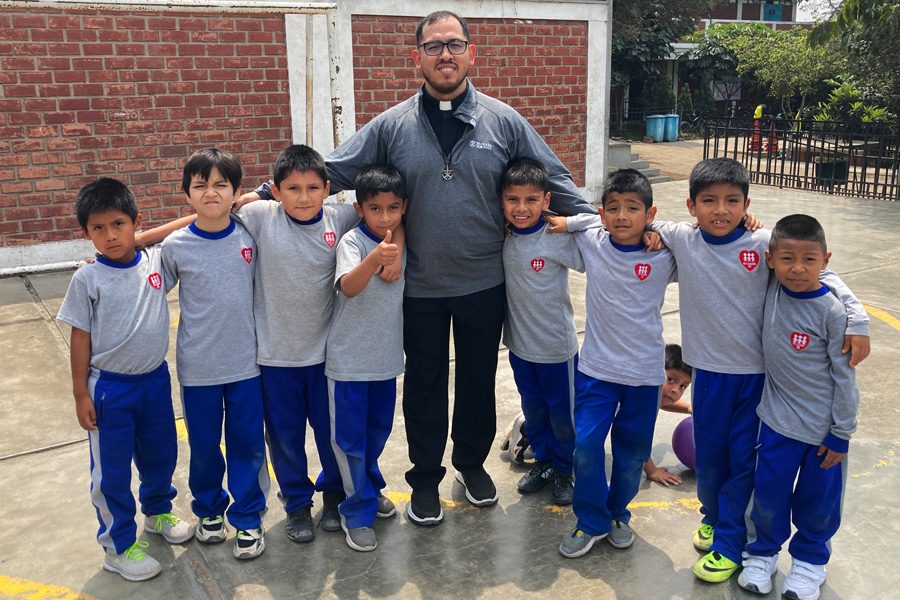
International Apostolic, Justice & Peace 2025-26 Project Preview
The Holy Cross Mission Center (HCMC) recently invited Holy Cross religious from six different countries to apply for the annual International...
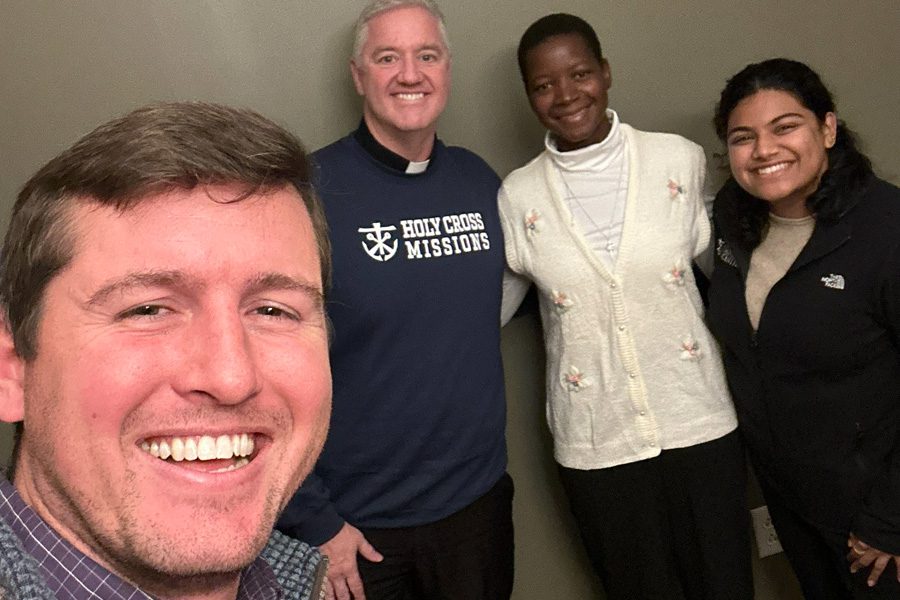
Community Outreach Updates: November 2025
The Holy Cross Mission Center (HCMC) is grateful to take this opportunity to share how we have engaged with the community in the past month. Baraka...

